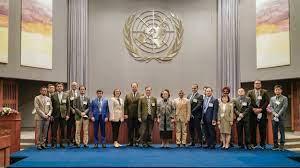
The rapid, widespread adoption of digital technology, spurred in large part by the COVID-19 pandemic, and its economic and societal ramifications are the key focus of deliberations at a United Nations forum this week.
The Committee on Information and Communications Technology, Science, Technology, and Innovation, which opened today, is set to examine how this digital transformation has brought a number of benefits and opportunities for people, governments and businesses, but also has further widened the digital divide both between and within countries in the region, opening new development gaps and reinforcing a vicious cycle of socio-economic inequalities.
“The United Nations has referred to the digital divide as the new face of inequality. That is why digital inclusion must be at the heart of digital transformation and accompanying digital policies and regulations if the promise to ‘leave no one behind’ is to be met,” said Armida Salsiah Alisjahbana, an Under-Secretary-General of the United Nations and Executive Secretary of the Economic and Social Commission for Asia and the Pacific (ESCAP).
This “digital big bang” brought about by the pandemic has compressed normal periods of societal adoption of digital technologies from years to months or even weeks, as digital technology has steadily taken over more aspects of people’s lives. Digital inclusion and resilient digital networks across the region have become the foundation for governments and the private sector to effectively mitigate the worst impacts of the pandemic.
According to the Asia-Pacific Digital Transformation Report 2022, released today by ESCAP, the region is now the most digitally divided in the world, with more than two billion people who do not have access to digital technologies.
However, many government and business services are now “digital by default,” thus the urgent need to develop new development paradigms, policy and regulatory frameworks in a more flexible, adaptive, and corroborative way.
At the heart of such new paradigms is the digital transformation process, where people are not just consumers but also creators of previously unheard-of products and services, thus accelerating the transformation of value systems and socio-economic structures.
The three-day Committee is expected to endorse the Asia-Pacific Information Superhighway action plan for 2022-2026, which consists of a set of coherent actions aimed at bridging the digital divide and accelerating digital transformation for an inclusive digital society.
Additionally, the Committee is preparing for the Fourth Ministerial Conference on Space Applications for Sustainable Development, to be held on 26 October in Jakarta. It is also expected to express support for the Asia-Pacific Digital Ministerial Conference 2022, organized by the Government of the Republic of Korea in cooperation with ESCAP, under the theme “Shaping Our Common Future,” from 9 to 10 November 2022 in Seoul as an important means of promoting multi-stakeholder partnerships on digital transformation in Asia and the Pacific.
Key dignitaries speaking at this year’s Committee include Ivan John E. Uy, Secretary of the Department of Information and Communications Technology of the Philippines; Chaiwut Thanakmanusorn, Minister of Digital Economy and Society of Thailand; Mohamed Shareef, State Minister of Environment, Climate Change and Technology of the Maldives; Gevorg Mantashyan, First Deputy Minister of High-Tech Industry of Armenia; Askar Zhambakin, Vice Minister of Digital Development, Innovations and Aerospace Industry of Kazakhstan; and Amandeep Singh Gill, the UN Secretary-General’s Envoy on Technology.
The Committee on Information and Communications Technology, Science, Technology and Innovation, Fourth Session will be held at the United Nations Conference Centre in Bangkok from 30 August to 1 September 2022. The Committee session will be held virtually via videoconference. Bangkok-based representatives from member States and international organizations are welcome to participate in person at the United Nations Conference Centre in Bangkok.
Delegates and participants are invited to register for the session by 10 August 2022.
YouTube webcasting is available below:
CICTSTI4 (Day 1): Tuesday 30 August 2022, from 1000-1600 hrs.
- YouTube link for 'Floor language': https://youtu.be/suxPrtimI_8
- YouTube link for 'English': https://youtu.be/tzQfp_Lfv3I
CICTSTI4 (Day 2): Wednesday 31 August 2022, from 1000-1600 hrs.
- YouTube link for 'Floor language': https://youtu.be/QyGCvFf_QU4
- YouTube link for 'English': https://youtu.be/L_QdhPDuYnQ
CICTSTI4 (Day 3): Thursday 1 September 2022, from 1400-1600 hrs.
- YouTube link for 'Floor language': https://youtu.be/XuTuVTMqGBQ
- YouTube link for 'English': https://youtu.be/ha5GfPmi5AA










Add new comment